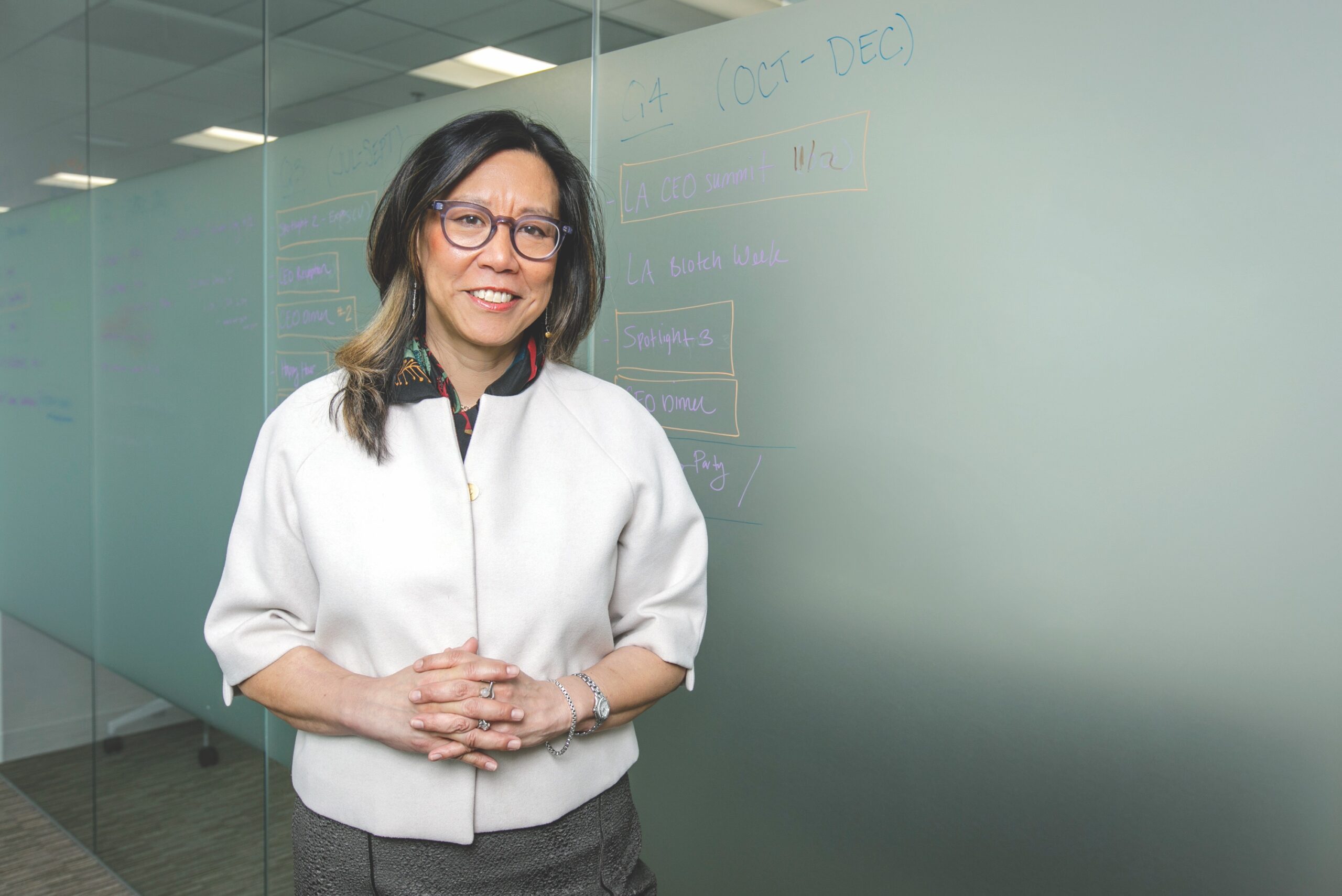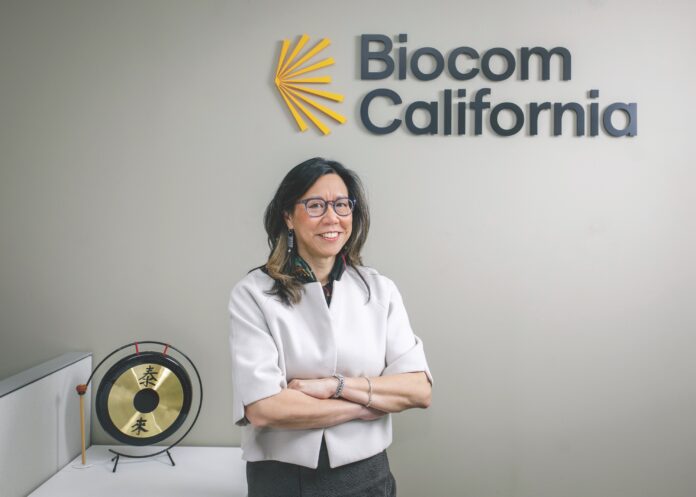In her role as executive director of the L.A. chapter of statewide advocacy group Biocom California, Stephanie Hsieh knows well the rapidly growing role that cancer immunotherapy research plays in the region’s bioscience and biotech industry.
But Hsieh has not just tracked the growth of the cancer immunotherapy market – she’s lived it. Prior to taking the helm of Biocom L.A., Hsieh was chief executive of Pasadena-based Meditope Biosciences, a cancer immunotherapy company spun out of Duarte-based City of Hope’s immunotherapy research program.
Hsieh sat down with the Business Journal to discuss the lure and current state of cancer immunotherapy research and development, as well as the appeal of the Los Angeles market for immunotherapy companies.
What is cancer immunotherapy and how is it being applied to cancer treatment?
Cancer immunotherapy is harnessing one’s own immune system to treat cancer. The first immune therapy was engineered antibodies to target something specific in cancer. These are big y-shaped molecules that target something in the body and either warn immune cells or attack cancer cells on their own. Then came T-cells, so-called natural killer cells and cytokines. These are all biologics or large molecules that you find in the body.
What is the main advantage of immunotherapy over more conventional forms of cancer treatment?
To treat cancer, the main strategies used to be what I call, “slash, burn or poison.” Slash is the surgical tool; radiation burns the tissue. And chemo is flooding the body with toxins and hoping they will kill the cancer cells faster than killing the rest of your body’s cells. All the conventional treatments are very blunt instruments. With immunotherapy, you can target the treatment to the cancer cells.
So this is what is meant by targeted immunotherapy?
Yes, but that’s only part of the picture. As people find ways to manipulate the immune system, they can target different cancers and harder-to-treat cancers. There are now all these different flavors of immunotherapies, like ice cream. The idea is to treat the cancer without overactivating the immune system to attack other parts of the body. Also, the therapy strategies have grown more precise over time.
Prior to joining Biocom L.A., you ran an immune-oncology startup. Can you tell us a little bit about that experience and about the company?
The company is called Meditope Biosciences and its headquarters was in Pasadena. I was a co-founder and the CEO. We started Meditope in 2012. I came from the patent technology area and had for some time been looking for interesting startups in the oncology space. One of the challenges was that the immunotherapy molecules can get very costly and complex to manufacture. Meditope’s technology, which was licensed from City of Hope, takes antibodies and turns them into what I call a Lego system that’s more simple and cost-efficient to scale up to manufacturing.
What’s happened to the company since you left?
I’m still a board member of Meditope. We have a new CEO in place now, Martin Latterich, as the company prepares to take its platform to clinical trials. The company is now more centered in San Diego, where the new CEO is. As for the technology, it consists of an antibody attached to a cytokine that does the tumor-cell killing. The first target is prostate cancer.
Funding overall for biotech and bioscience companies has been a bit weak over the past couple of years. But funding for immunotherapy companies appears relatively strong. What do you think has captivated the interest of investors?
Funding for immune therapies has remained strong – and not just for immune-oncology, but also for a host of other diseases and conditions, such as autoimmune and nervous system disorders. There is a tremendous amount of excitement with these new approaches.
Why do you think L.A. has become a center for cancer immunotherapy companies?
First you go to the research institutions: UCLA Health and City of Hope are the two longstanding leaders here. City of Hope was one of the first out the door with the targeted antibody/immunotherapy approaches to cancer. You had folks like (Arthur) Riggs and (Shmuel) Cabilly at City of Hope in the 1970s and 1980s. In fact, Arthur was Meditope’s first investor. This immunotherapy approach was born here – at least I think so. Then you had UCLA in the 1990s with Arie Belldegrun and Agensys (purchased by Astellas Pharma Inc. for $537 million in 2007) and then Kite (purchased by Gilead Sciences Inc. for $11.9 billion in 2017).
So this is sort of like Stanford
University spawning Silicon Valley?
There have indeed been lots of spinouts from the pioneering research being done here. But it’s more than that. There’s more NIH (National Institutes of Health) funding coming to Los Angeles County than any other county in California. And there’s been a lot of sharing of ideas. I’ve lived and worked in the Bay Area and Cambridge (Massachusetts). There’s just something special in the air here that lends itself to collaboration.

What are the biggest challenges for the Los Angeles region to keep its leading role in the cancer immunotherapy field?
The biggest issue is a lack of space. We have 0% vacancy – that’s right, no vacancy – for wet lab and research and development space here in Los Angeles County. (Wet labs are used to manipulate liquids, chemicals and biological matter, such as T-cells.)
Another hurdle is the translational work: actually commercializing the research and getting it to work in humans at all and then over time in large numbers of humans. We’re really good at curing cancer in mice and rats right now – but not humans.
What’s been the obstacle in commercializing the basic research that’s going on here?
The main issue has been on the funding side, and it’s getting the funds. I call it crossing the “Valley of Death.” To get from the lab bench to the bedside takes 10 to 15 years and millions upon millions of dollars – with much of that going to clinical trials. For every drug that makes it through, there are hundreds that die on the vine.
That’s an issue for all bioscience companies, though, isn’t it?
Yes, but it’s so much more acute with cancer immunotherapy companies because the molecules you’re dealing with are bigger and more complex, and so, therefore, are the drug platforms. And there’s no way to hedge the risk by looking at past examples, since it’s all so new.
On a personal note, you’re moving to a new position this week with a new local bioscience initiative program. Can you tell us a bit about this new program and why you decided to leave Biocom L.A. to run it?
First, I’m not leaving Biocom L.A. entirely – I’m just stepping back from the executive director role, effective in mid-March. The new initiative is called Grow LA Bio and it’s a coalition between Biocom, the Los Angeles County Economic Development Corp., Bioscience LA and the LARTA Institute. I’ll be the leader of the coalition. The main goal is to find the space to allow companies to grow here. We have the raw ingredients, but we haven’t yet developed a mega-cluster like the Bay Area, San Diego or Cambridge.
What do you mean by mega-cluster?
We do have bioscience clusters here – I call them “micro-clusters.” I’m talking about areas like the 101 Corridor near Amgen (Inc.) in Thousand Oaks, the Westwood – Silicon Beach area, and Pasadena/San Gabriel Valley. But we want to harness the power of all these micro-clusters into one giant mega-cluster.
How much funding is this new initiative going to have?
We’re still figuring that out. I can say it will likely be in the high six digits or low seven digits. The key challenge right now is that we don’t want this just to be another nonprofit in the alphabet soup of bioscience nonprofits we already have here. So we’re trying to work out the structure and governance for this new program. That’s what I’m going to be spending a lot of time for the next few months and it’s why I’m stepping back from my duties as executive director of Biocom L.A.
